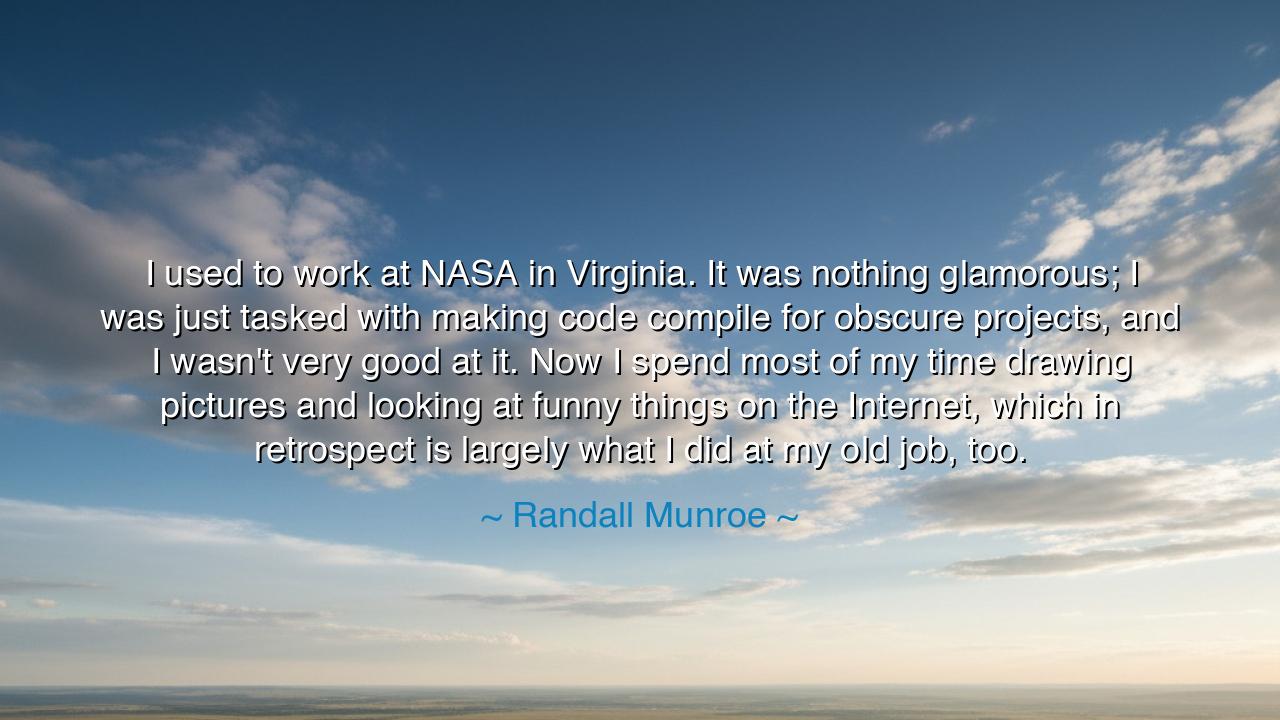
I used to work at NASA in Virginia. It was nothing glamorous; I
I used to work at NASA in Virginia. It was nothing glamorous; I was just tasked with making code compile for obscure projects, and I wasn't very good at it. Now I spend most of my time drawing pictures and looking at funny things on the Internet, which in retrospect is largely what I did at my old job, too.






In the words of Randall Munroe, creator of xkcd, “I used to work at NASA in Virginia. It was nothing glamorous; I was just tasked with making code compile for obscure projects, and I wasn't very good at it. Now I spend most of my time drawing pictures and looking at funny things on the Internet, which in retrospect is largely what I did at my old job, too.” Beneath the humor and humility of these words lies a deep and timeless truth — that life’s journey often leads us in circles, not because we are lost, but because the essence of who we are remains constant. Munroe speaks with the wit of the philosopher disguised as the fool, revealing that our purpose is rarely found in the grandeur of titles, but in the quiet persistence of authentic joy.
This quote is a hymn to simplicity, to the sacred art of recognizing one’s own nature amid the noise of prestige. Munroe, who once walked the halls of NASA — that temple of human aspiration — confesses that his true fulfillment was never found in the complexity of machines, but in the joy of curiosity. His words remind us that the divine spark which drives discovery is not confined to the laboratory or the office; it lives in the same wonder that draws a child to sketch stars in the margins of a notebook. Whether writing code or drawing cartoons, the core impulse is the same: to understand, to play, to connect.
The ancients would have understood Munroe’s revelation well. For Diogenes of Sinope, the Cynic philosopher, once mocked the great men of Athens by living in a barrel and laughing at their pretensions. When Alexander the Great visited him and asked what gift he desired, Diogenes replied only, “Stand out of my sunlight.” Like Munroe, Diogenes found meaning not in grandeur but in clarity — the freedom to live as one truly is. Both men remind us that wisdom often wears the mask of humor, and that laughter is not the absence of seriousness, but the highest form of it.
Munroe’s tale also speaks to the quiet rebellion of creative purpose. Many who work in noble institutions or celebrated fields believe they must remain there to have meaning. Yet he left NASA — the pinnacle of intellectual achievement — to pursue drawing stick figures and jokes about math. And in doing so, he became a teacher to millions. This is the paradox of life: the world tells us that worth comes from status, yet fulfillment is born from alignment — when our daily acts match the rhythm of our inner voice. Munroe did not abandon science; he translated it into art, into a language of laughter and wonder that could reach every heart.
There is also humility here, a gentle rejection of the illusion of greatness. Munroe calls his NASA work “nothing glamorous” and admits he “wasn’t very good at it,” yet he speaks without shame. This is the voice of one who has learned the secret of self-acceptance — that our flaws are not failures, but signposts guiding us toward what we are meant to do. His humor disarms pride and replaces it with peace. Like the Stoics who found freedom in acceptance of imperfection, Munroe invites us to laugh at our own shortcomings, to see that even the detours of life are part of the design.
In his reflection, we hear also the echo of continuity — that what we love will find us, no matter where we go. Munroe’s realization that his work at NASA and his art both revolved around “looking at funny things on the Internet” is not mockery, but enlightenment. It shows that the essence of our spirit will persist through every disguise we wear. We cannot escape our true calling; it will resurface, even in the most unexpected forms. As the philosopher Heraclitus said, “Character is destiny.” The one who delights in discovery will find discovery in everything — in stars, in circuits, in comic strips.
So, let this be the lesson: do not chase grandeur — chase authenticity. Whether you labor in a laboratory or draw in a quiet room, do what brings you alive, for that is where your genius dwells. The world does not need more seriousness; it needs more sincerity. The work of the heart, however small it seems, ripples further than any institutional title.
Practical teaching: Each day, seek not what looks important, but what feels true. Ask yourself, “What work makes me forget the clock?” Pursue that — even if it seems foolish, even if others call it small. Learn to laugh at your own path, to see the humor in your imperfections, and to honor the thread of curiosity that weaves through your life. For in that thread lies the secret unity of all things — the same wonder that builds rockets and draws stick figures, the same laughter that belongs to gods and mortals alike.






AAdministratorAdministrator
Welcome, honored guests. Please leave a comment, we will respond soon